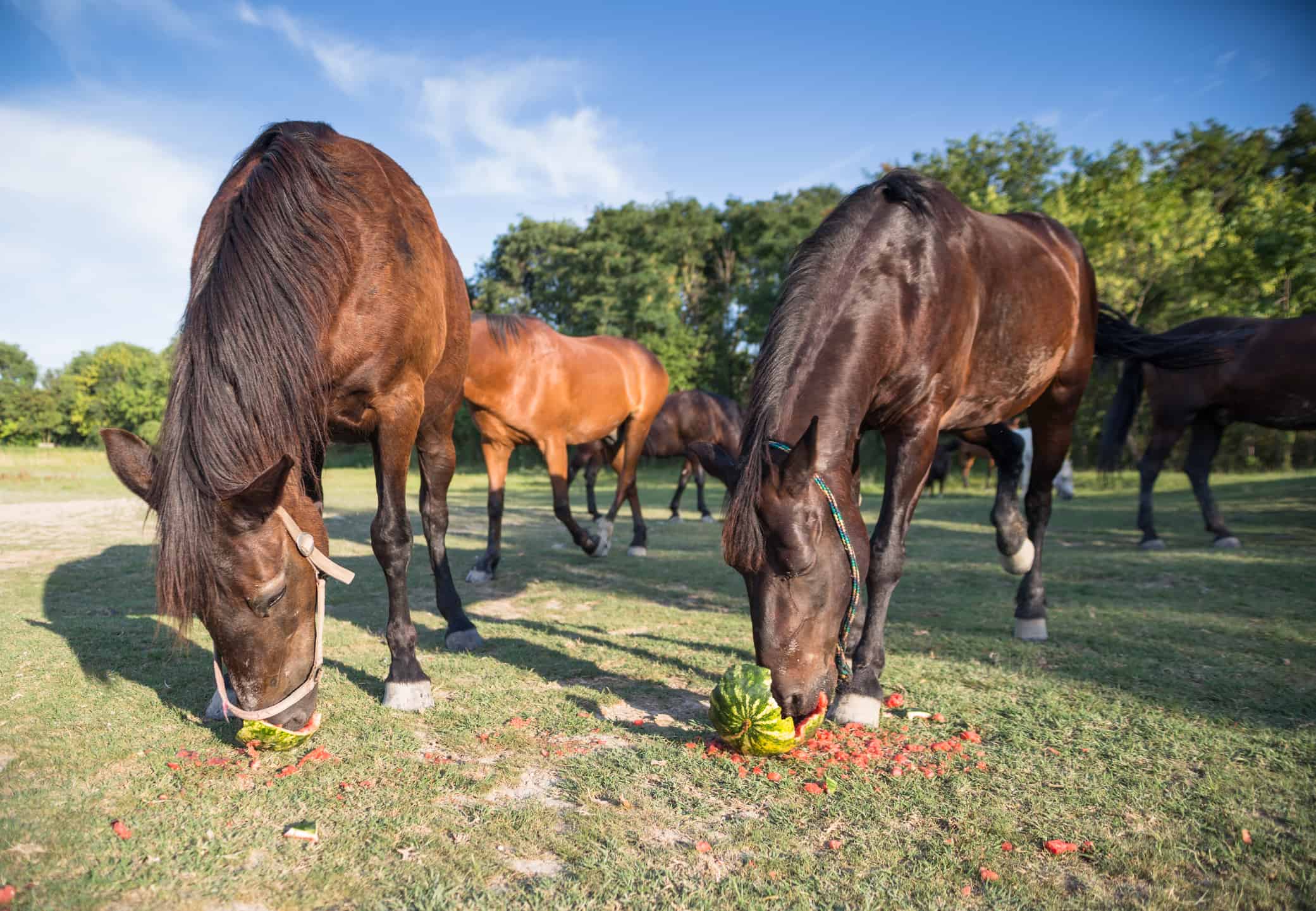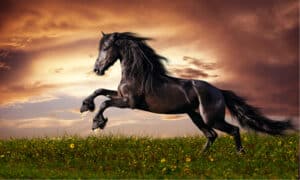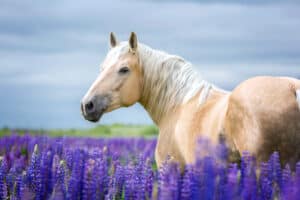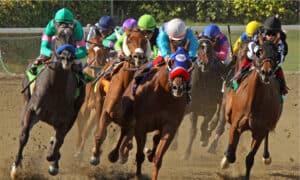Horses are herbivores that eat a plant-based diet. Food for horses might seem boring to us, but it’s full of just the right amount of nutrients they need to be happy and healthy. However, what a horse eats depends on whether they are wild or domesticated. A wild horse forages on grasses and shrubs native to their environment while a domesticated horse has full access to hay and gets grain between two to three times a day. Let’s explore more about the horse’s diet!
What Do Horses Eat?
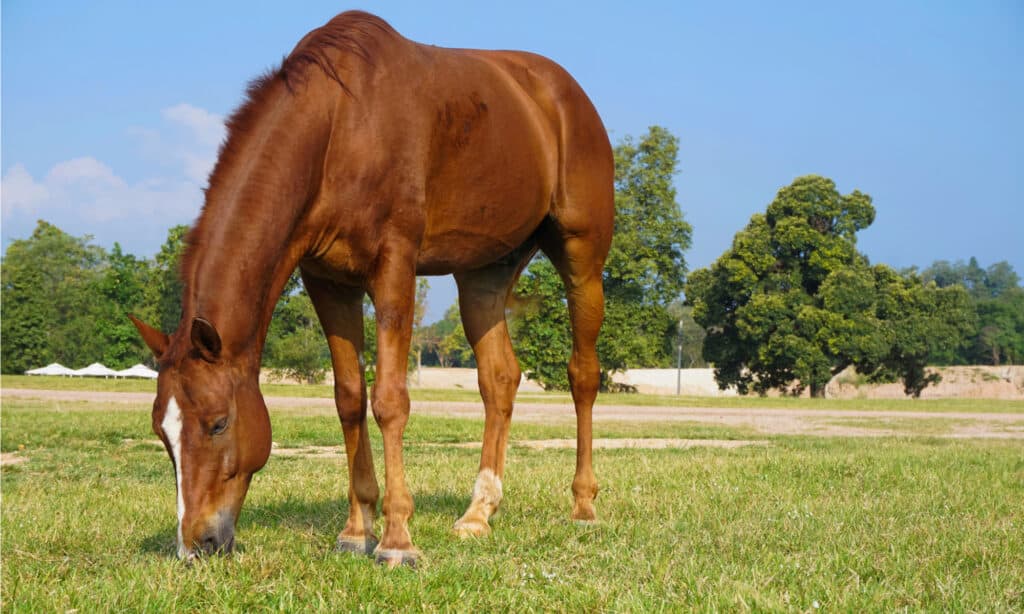
A grazing horse is a common sight! That’s because horse food includes native grasses that they forage on for most of the day.
©Wynn Dhyana/Shutterstock.com
The most common food that horses forage on are native grasses, hay, and barley grain. Other edibles include:
- Clover
- Alfalfa
- Oats
- Corn
- Wheat
- Bran
- Fruits
- Root vegetables
- Certain flowers (beware of the poisonous ones though!)
As herbivores, plant matter is easy for horses to metabolize. Even so, their sensitive digestive system means it’s important to keep your horse on a strict diet. Doing this prevents most episodes of colic and can keep other health complications at bay.
Just like us, horses can be choosy. Work with your veterinarian to customize the meal plan best suited for your horse. This becomes especially important if you decide to compete, put your horse to work around the farm, or use them for more than just light riding around the arena.
What Kind of and How Much Feed Does Your Horse Need?
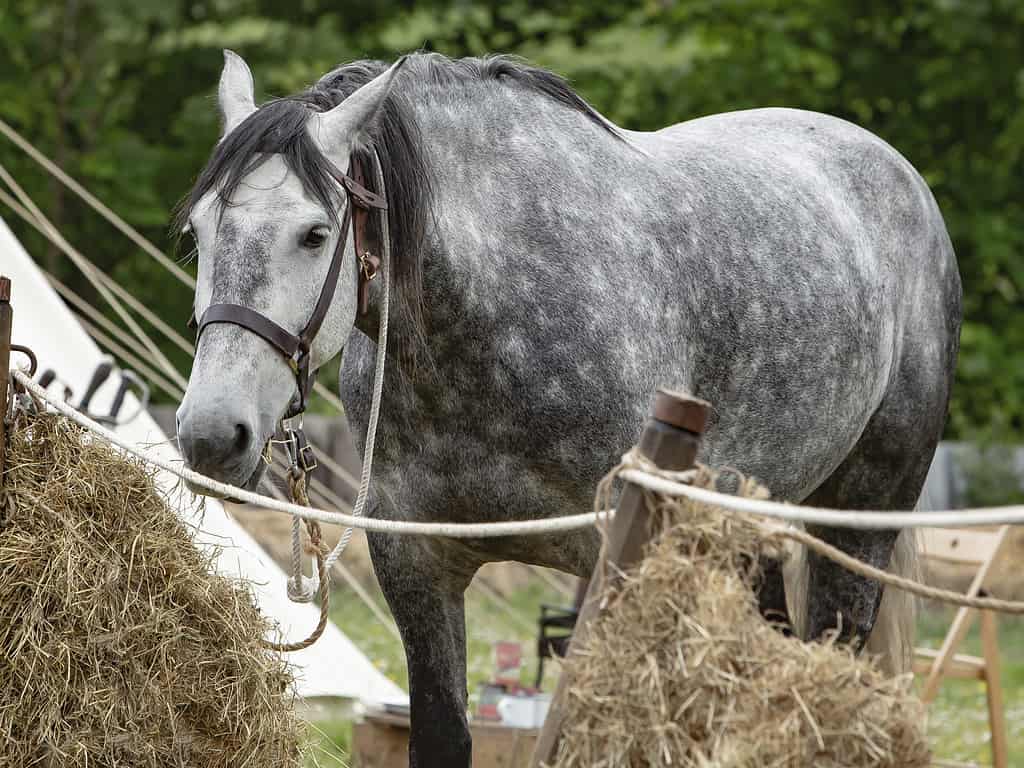
All domesticated horses need access to forage — they consume 2% of their body weight in hay daily!
©Sonya Kate Wilson/ via Getty Images
The type of food and amount to feed your horse depends on two main factors: your budget and your horse’s activity level.
For example, a lesson pony does not need expensive performance grain whereas an upper-level eventing horse might. However, a pony used for lessons might benefit from higher-quality hay or grain if you want to extend their time in the program.
It truly depends on your goals and how much you are willing to spend on food. One thing is for certain though: A horse used for riding needs access to grass and hay as well as supplemental feed like grain.
The amount of feed your horse needs depends on their weight, age, and activity level. The average 1,000-pound horse requires around 20 pounds of food daily split into multiple small meals and unlimited access to forage.
But what foods shouldn’t be included in those 20 pounds a day?
6 Foods to Avoid Feeding Your Horse
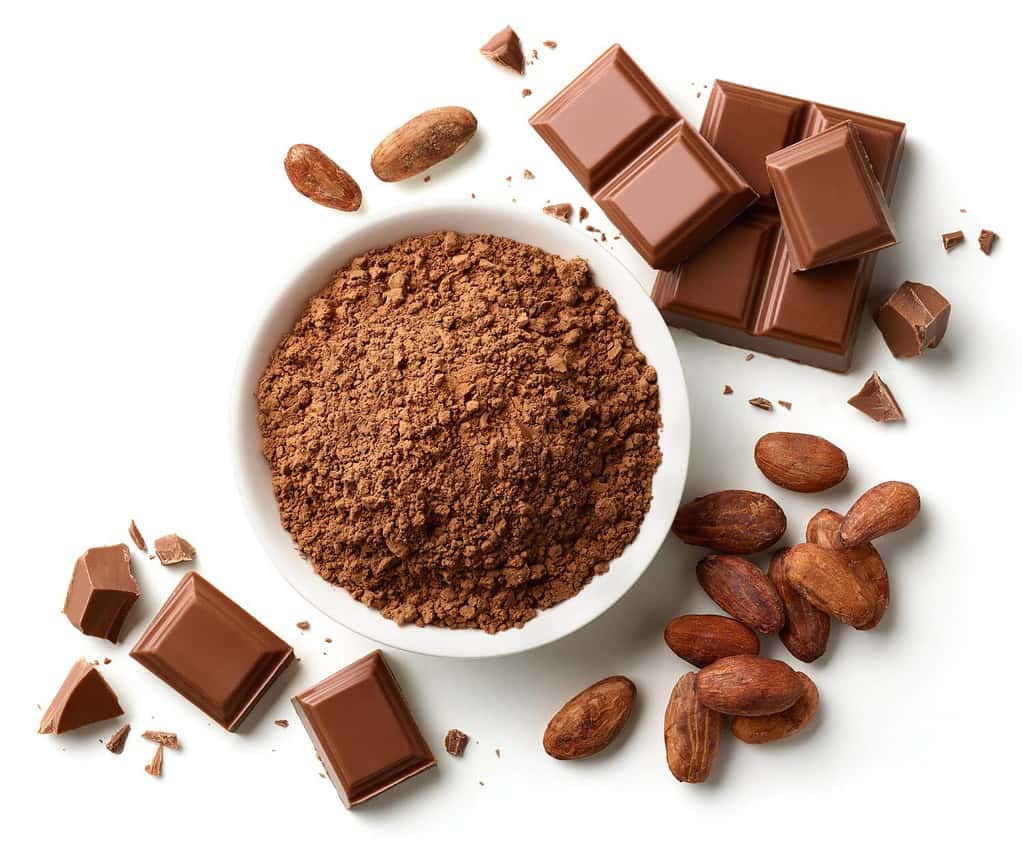
Chocolate is an incredibly toxic food for horses. Chocolate toxicity can lead to colic or even death.
©baibaz/Shutterstock.com
You got your veterinarian’s recommendations and did some research of your own. Now you know what’s appropriate to feed your horse and how much they need to be healthy (and happy!). It’s time to discuss the everyday foods that you should avoid feeding your horse because they are toxic if ingested.
1. Chocolate
The number one culprit of toxic food for horses is chocolate. As much as we like to satisfy our sweet tooth with chocolate, it isn’t suitable for equines. The theobromine and caffeine in cocoa beans make it harmful for horses to consume.
2. Onions
Why are onions on our list of what to not let your equine eat? Horses that eat onions can develop anemia and other health complications. Similarly, it’s also not recommended to feed them garlic. If you notice symptoms like a fast, weak pulse or dark red-brown urine, it’s time to call your vet.
Don’t remember feeding your horse either of these items? Check your pasture. The potential for wild onion growth is low but never zero.
3. Potatoes
Potatoes are a member of the nightshade family of plants, which wreaks havoc on a horse’s nervous system. You’ll know fairly quickly if your horse ate potatoes — colic occurs two to four hours after ingestion. The compounds atropine and solanine are to thank for that. However, horses don’t usually like the taste of potatoes so that makes it easy to avoid.
4. Tomatoes
Tomatoes are another item low on the list of foods a horse would choose if they had the option. But that’s a good thing. The solanine in tomatoes disrupts digestive function and can make horses colic. Keep your chef salads in the tack room or at least out of reach to avoid the health problems associated with this toxic food for horses.
5. Cabbage
An unlikely health problem for horses that stems from a typically healthy food for humans? Gas buildup due to a sugar called raffinose in vegetables like cabbage can cause discomfort or even pain. In extreme cases, an episode of colic can occur.
6. Brussel Sprouts
Brussel sprouts produce intestinal gas buildup, which makes most animals fart but can cause digestive issues in horses. Too much gas build-up leads to colic, which in some cases, can be fatal. Some sources say it’s acceptable in moderation, but why risk it? There are many other delicious and healthy treats to give your horse that they’ll love even more!
Vet-Approved Treats For Horses
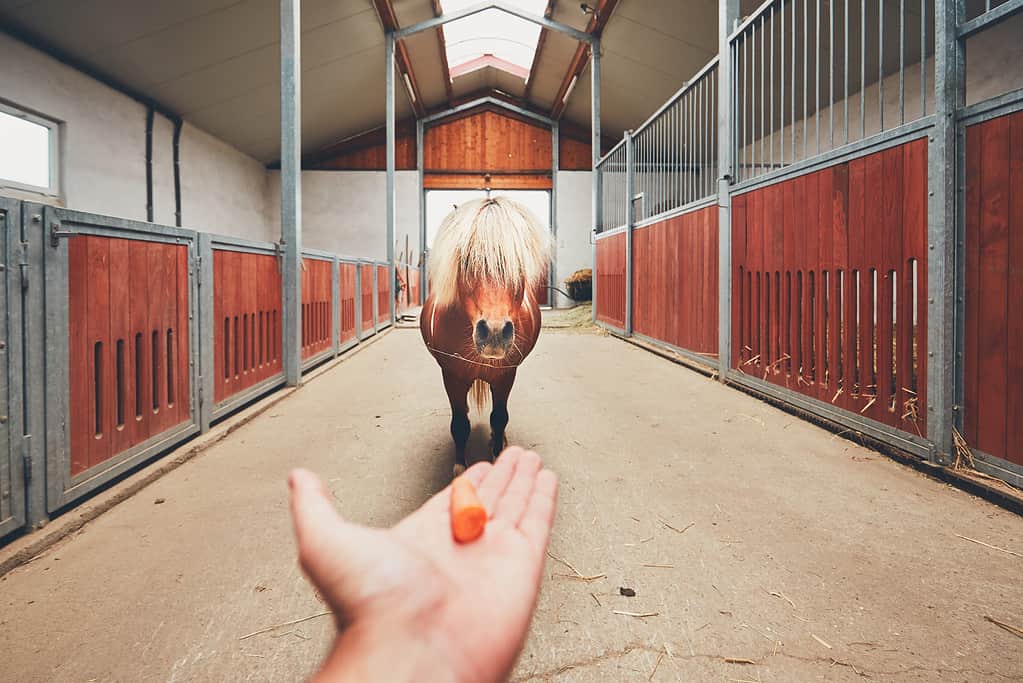
Feel free to offer your furry friend a carrot for a job well done. It’s a safe food for horses and they usually love the crunch!
©Chalabala/iStock via Getty Images
Many human-grade foods are perfectly healthy to give to your horse. The key is always to do it in moderation. Here are some vet-approved
Fruits
Fruits like apples and bananas are not only delicious but good for your horse. The calcium and potassium in these fruits are good for a horse’s bones, muscles, and heart.
Vegetables
Carrots, squash, and other root vegetables are safe to feed to horses. Carrots have vitamin A and squash is high in fiber, both excellent minerals for supporting immune and digestive health.
Sweets
One type of food that may not be good for horses physically but also isn’t toxic to them? Sweets. Sugar cubes and peppermints are great options for after a hard ride, just not a lot and not every day. If you’re more of the homemade treat type, molasses is still one of the most popular ingredients to use in homemade horse treats to this day. Trace amounts of molasses are even found in many brands of grain due to its enticing flavor!
Other Foods
Right behind molasses, pumpkin, and peanut butter are two other ingredients in some of the most widely loved homemade horse treats. They are easy to find, inexpensive, and provide a mood boost to horses everywhere! Peanut butter, in particular, is high in protein, zinc, magnesium, and vitamins B3 and B6. A little goes a long way.
Some horses prefer certain flavors and textures over others, so be sure to experiment with different vet-approved foods to find what suits your horse’s preferences. Just be sure to give these foods as a special treat, not a supplement to their normal diet.
Summary of Safe and Toxic Foods for Horses
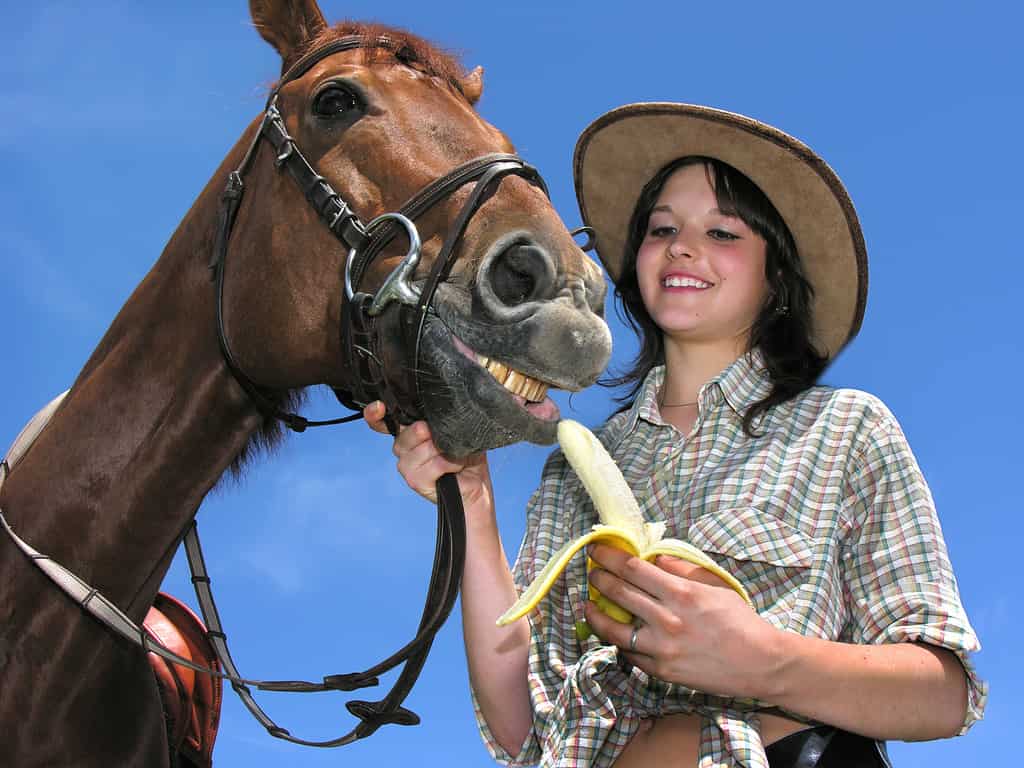
Some horses love bananas, others don’t, but it is a safe food to feed them!
©Yuriy Sukhovenko/iStock via Getty Images
We covered quite a bit of information about what food is acceptable and unacceptable for horses to eat. Let’s do a quick recap of what we just learned.
Horses can eat a lot of the same foods we can as a special treat, but not all of them! Here is a list of the common foods safe for equines to eat as well as ones that are not.
| Food | Safe to Eat | Recommended Amount |
|---|---|---|
| Apples | Yes | <1-2 pounds/feeding |
| Bananas | Yes | <1-2 pounds/feeding |
| Barley | Yes | ~1 pound/feeding |
| Brussel sprouts | No | None |
| Cabbage | No | None |
| Carrots | Yes | <1-2 pounds/feeding |
| Celery | Yes | <1-2 pounds/feeding |
| Chocolate | No | None |
| Eggs | Yes | <1-2 pounds/feeding |
| Grapes | Yes | <1-2 pounds/feeding |
| Grass | Yes | ~15 pounds/day |
| Green beans | Yes | <1-2 pounds/feeding |
| Hay | Yes | ~15 pounds/day |
| Melons | Yes | <1-2 pounds/feeding |
| Molasses | Yes | In moderation |
| Onions | No | None |
| Peanut butter | Yes | In moderation |
| Peas | Yes | <1-2 pounds/feeding |
| Peppermints | Yes | In moderation |
| Pits (avocado, cherry, peach) | No | None |
| Potatoes | No | None |
| Pumpkin | Yes | <1-2 pounds/feeding |
| Raisins | Yes | <1-2 pounds/feeding |
| Squash | Yes | <1-2 pounds/feeding |
| Sugar cubes | Yes | In moderation |
| Tomatoes | No | None |
As always, consult your veterinarian before you feed your horse anything on this list. Just know that some treats, in moderation, can be safe for your horse to have. Now go give them a carrot — they deserve it!
Thank you for reading! Have some feedback for us? Contact the AZ Animals editorial team.

